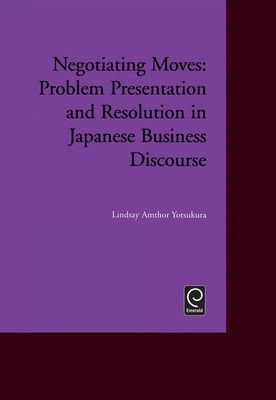
- We will send in 10–14 business days.
- Author: Lindsay Amthor Yotsukura
- Publisher: Elsevier Science Ltd
- ISBN-10: 0080441653
- ISBN-13: 9780080441658
- Format: 16.3 x 23.1 x 2.3 cm, kieti viršeliai
- Language: English
- SAVE -10% with code: EXTRA
Reviews
Description
This study of Japanese business discourse adopts Bakhtin's notion of speech genres as an heuristic in order to analyze groups of spoken texts which display similar constellations of compositional, thematic, and stylistic features. Drawing upon a corpus of over 540 naturally-occurring telephone conversations collected in the Kanto and Kansai areas of Japan, Lindsay Amthor Yotsukura demonstrates how Japanese business professionals present, negotiate and clarify their identities and intentions and enlist and offer assistance with respect to a variety of transactions such as toiawase inquiries, merchandise orders, shipping confirmations, and reports of delivery problems. In the process, she highlights the critical deictic function of linguistic devices such as the no desu (extended predicate) construction in producing formulations, and politeness expressions that index the dynamic uti/soto ('inside'/ 'outside') continuum. She also illustrates some of the ways in which these "negotiating moves" are consonant with a number of Japanese "folk" metalinguistic concepts and expressions in order to underscore the importance of shared assumptions and expectations developed through experience in performing these genres of "talk at work" on a regular, collaborative, basis. Yotsukura's findings represent a unique and significant contribution to the discourse - and conversation-analytic literature on business negotiation because the field has until now focused almost exclusively on English and other Indo-European languages. The study should therefore provide an entirely different but equally important ethnographic perspective on the culturally nuanced, rhetorical strategies used by a non-Western community of speakers for the presentation and resolution of problems in business transactions.
EXTRA 10 % discount with code: EXTRA
The promotion ends in 22d.08:09:50
The discount code is valid when purchasing from 10 €. Discounts do not stack.
- Author: Lindsay Amthor Yotsukura
- Publisher: Elsevier Science Ltd
- ISBN-10: 0080441653
- ISBN-13: 9780080441658
- Format: 16.3 x 23.1 x 2.3 cm, kieti viršeliai
- Language: English English
This study of Japanese business discourse adopts Bakhtin's notion of speech genres as an heuristic in order to analyze groups of spoken texts which display similar constellations of compositional, thematic, and stylistic features. Drawing upon a corpus of over 540 naturally-occurring telephone conversations collected in the Kanto and Kansai areas of Japan, Lindsay Amthor Yotsukura demonstrates how Japanese business professionals present, negotiate and clarify their identities and intentions and enlist and offer assistance with respect to a variety of transactions such as toiawase inquiries, merchandise orders, shipping confirmations, and reports of delivery problems. In the process, she highlights the critical deictic function of linguistic devices such as the no desu (extended predicate) construction in producing formulations, and politeness expressions that index the dynamic uti/soto ('inside'/ 'outside') continuum. She also illustrates some of the ways in which these "negotiating moves" are consonant with a number of Japanese "folk" metalinguistic concepts and expressions in order to underscore the importance of shared assumptions and expectations developed through experience in performing these genres of "talk at work" on a regular, collaborative, basis. Yotsukura's findings represent a unique and significant contribution to the discourse - and conversation-analytic literature on business negotiation because the field has until now focused almost exclusively on English and other Indo-European languages. The study should therefore provide an entirely different but equally important ethnographic perspective on the culturally nuanced, rhetorical strategies used by a non-Western community of speakers for the presentation and resolution of problems in business transactions.


Reviews